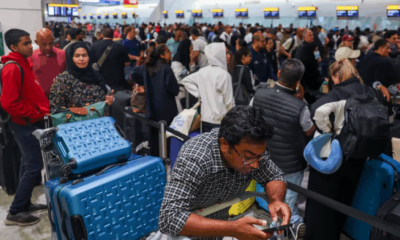General
Reinforcement of Town Planning Laws in Plateau State

Senate President Godswill Akpabio has urged the Plateau State Government to strengthen town planning laws to prevent future tragedies like the recent school building collapse that claimed lives of students. During a meeting with Governor Caleb Mutfwang and traditional rulers, Akpabio emphasized the importance of enforcing regulations in the construction industry.
“We extend our condolences for the tragic building collapse. To prevent such incidents, it’s crucial to strictly enforce town planning laws without exceptions,” Akpabio stated. “Regardless of status, any building violating regulations, like obstructing natural waterways, must face consequences.”
Acknowledging the sadness nationwide over the loss of lives, Akpabio assured the state government of support during this mourning period. Governor Mutfwang, in turn, highlighted their commitment to safety and development, including participation in legislative efforts like the Nigerian Institute of Mining and Geosciences Bill.
The incident at Saint Academy underscores the need for proactive measures to ensure safety and compliance with building standards, fostering a safer environment for all residents of Plateau State.
General
South Korea’s ex-president jailed for life over martial law attempt

South Korea has entered a new chapter in its democratic journey after former president Yoon Suk Yeol was sentenced to life imprisonment for orchestrating an insurrection through an attempted imposition of military rule.
A court in Seoul ruled that Yoon sought to undermine constitutional order by deploying military forces to seal off the National Assembly of South Korea and ordering the detention of political opponents on 3 December 2024. Presiding judge Ji Gwi-yeon said the actions caused profound harm to the nation’s democratic foundations and warranted severe punishment. Prosecutors had pushed for the death penalty.
Although the martial law order lasted only a few hours before being overturned by lawmakers, its aftermath has reshaped the political landscape. Large crowds of Yoon’s supporters gathered outside the court ahead of sentencing, holding banners and expressing hope for his return. Across from them stood demonstrators demanding the harshest penalty.
Yoon remained composed as the ruling was delivered. His legal team rejected the judgment, claiming it lacked evidentiary basis and accusing the court of bias. An appeal from either side would move the case to the Supreme Court of Korea, potentially extending legal proceedings for months.
The crisis began when Yoon announced martial law during a televised address, citing the need to defend the state from forces he alleged were sympathetic to North Korea. However, the move unfolded against a backdrop of mounting domestic pressure, including legislative gridlock and corruption allegations involving his wife.
Lawmakers ultimately forced their way into the National Assembly to reverse the decree, triggering a period of political upheaval that led to Yoon’s impeachment and multiple prosecutions of senior officials.
The court has already handed down significant sentences to others implicated in the plot. Former prime minister Han Duck-soo received a 23-year prison term, while former defence minister Kim Yong-hyun was jailed for 30 years after advising the martial law order.
Additional convictions have followed for key figures including ex-interior minister Lee Sang-min, former intelligence commander Roh Sang-won, and ex-police chief Cho Ji-ho—with judges describing the episode as an “insurrection from the top”.
General
Trump threatens Canada with 100% tariffs over China trade deal

US President Donald Trump has warned that Canada could face sweeping trade penalties if it deepens its commercial ties with China, signalling a fresh phase in North American trade tensions even as global economic relationships continue to evolve.
In a message posted on his Truth Social platform on Saturday, Trump said the United States would impose a 100% tariff on all Canadian goods entering the country should Ottawa proceed with a trade agreement with Beijing. “If Canada makes a deal with China, it will immediately be hit with a 100% Tariff against all Canadian goods and products coming into the U.S.A.,” he wrote.
The warning comes amid increasingly strained relations between Trump and Canadian Prime Minister Mark Carney. Tensions have intensified following Carney’s recent speech at the World Economic Forum in Davos, Switzerland, where he called for smaller and mid-sized nations to assert themselves amid shifting global power structures. His remarks were widely interpreted as a pushback against the dominance of major powers in shaping the world economic order.
Carney has also held high-level talks with Chinese President Xi Jinping, after which Canada announced it had reached a trade agreement with China. The deal reportedly includes cooperation on electric vehicles, a sector seen as central to the future of global manufacturing and the green energy transition.
Responding to those developments, Trump again referred to the Canadian leader as “Governor Carney” and accused Canada of attempting to serve as a conduit for Chinese exports into the US market. He wrote that if Carney “thinks he is going to make Canada a ‘Drop Off Port’ for China to send goods and products into the United States, he is sorely mistaken.”
While Trump did not outline a specific timeline or provide further details on how the proposed tariffs would be implemented, his remarks echoed earlier rhetoric. Last year, during a previous dispute, Trump repeatedly described Canada as America’s “51st state,” labelled its leader a “governor,” and even suggested the US might seek to acquire the country outright — comments that drew strong reactions north of the border.
Despite these sharp exchanges, relations between Washington and Ottawa had shown signs of stabilising in recent months. However, Trump’s renewed focus on territorial ambitions regarding Greenland and his critical comments about Nato have again placed him at odds with both Canadian and European leaders.
In Davos this week, Carney stopped short of naming Trump directly but cautioned that the US-led global order was at risk of a “rupture,” language that appeared to provoke a forceful response from the US president. Speaking after Carney, Trump asserted the depth of economic ties between the two neighbours, saying, “Canada lives because of the United States.”
General
Why Businesses in Cypress, TX Are Turning to Abii & Associates for Legal Guidance

As the commercial landscape in Cypress, Texas continues to expand, more local businesses are recognizing the importance of having legal protection built into their operations. From startup founders to seasoned entrepreneurs, one law firm is quickly becoming the go-to resource for business legal services: Abii & Associates.
With a growing number of small and mid-sized businesses calling Cypress home, the need for reliable, strategic legal counsel has never been greater. Abii & Associates has stepped in to fill that gap, offering tailored legal solutions for companies navigating formation, contracts, compliance, and growth challenges.
Legal Clarity for Local Business Owners
Running a successful business in Cypress, TX requires more than just a good idea. Business owners must consider how to structure their companies, protect their intellectual property, negotiate contracts, and comply with state and federal laws.
Abii & Associates provides a full range of business and corporate legal services, including:
- LLC and corporation formation
- Contract drafting and review
- Employment policies and advisory
- Commercial lease and vendor agreements
- Partnership and shareholder disputes
- Business purchases and sales
- Regulatory compliance and liability protection
“Businesses in Cypress, TX deserve legal support that’s both strategic and personal,” said a spokesperson for the firm. “We help clients make smart decisions today to avoid expensive problems tomorrow.”
Trusted by the Cypress Business Community
What sets Abii & Associates apart is their hands-on, responsive approach. Business owners report that the firm offers legal advice that’s easy to understand—and even easier to implement.
One local entrepreneur shared,
“They took the time to understand my business, not just my legal question. The advice was spot-on, and it gave me confidence moving forward.”
Abii & Associates doesn’t rely on cookie-cutter templates or generic solutions. Instead, they craft legal strategies that align with the unique structure, size, and goals of each business they serve.
Supporting Growth in Cypress, TX
Cypress continues to attract new residents and businesses, making it a key hub for economic development in the Houston metro area. Abii & Associates’ decision to expand services in the area is already making a difference for local companies looking to protect and grow their enterprises.
“We’re committed to helping businesses in Cypress, TX build on a strong legal foundation,” the firm adds. “When your legal framework is solid, your business is freer to thrive.”
To learn more about Abii & Associates’ services for Cypress business owners, visit:
👉 https://www.abiilegal.com/practice-area/business-and-corporate-lawyer-serving-cypress-texas
-

 News1 week ago
News1 week agoBritish Tourist Among 19 Victims in Tragic Nepal Bus Crash
-

 News1 week ago
News1 week agoMore than 5,000 flights cancelled as major snow storm blasts US north-east
-

 News5 days ago
News5 days agoTram derails in Milan, leaving one dead and dozens injured
-

 News1 week ago
News1 week agoTrump’s Global Tariff Rollout Begins at 10% Amid Policy Adjustments
-

 News1 week ago
News1 week agoLouvre Director Steps Down Following Jewel Heist and Security Review
-

 Entertainment1 week ago
Entertainment1 week agoRobert Carradine, dies aged 71
-

 Sports7 days ago
Sports7 days agoMan Utd ruled out signing Osimhen ‘because of Afcon’
-

 Sports7 days ago
Sports7 days agoJoshua crash driver case adjourned to March

















